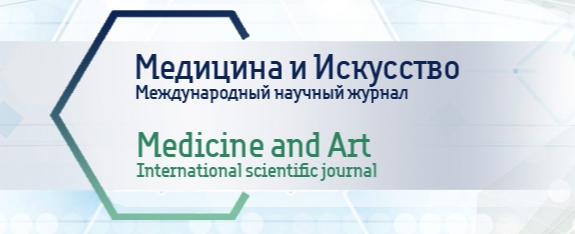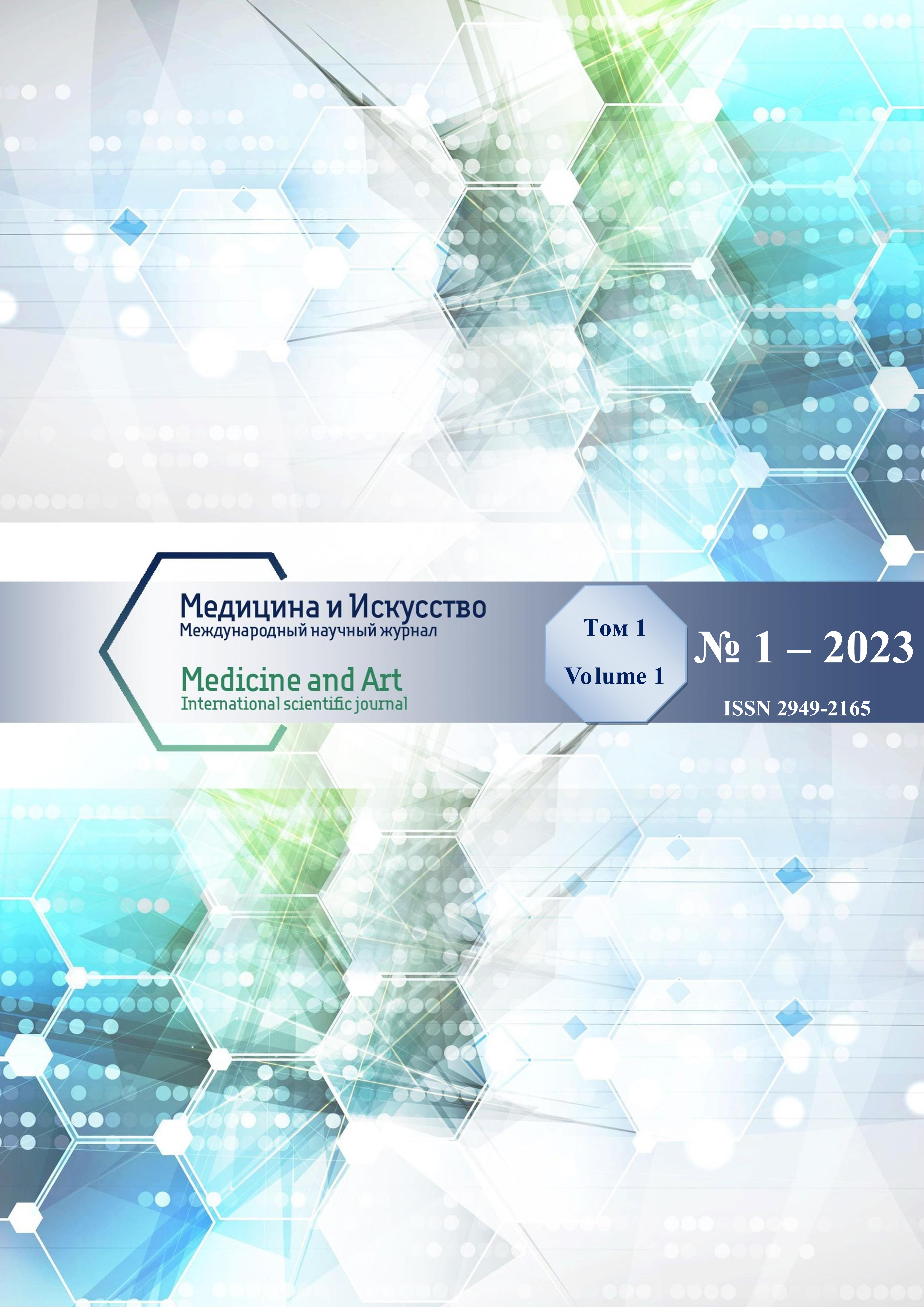Russian Federation
UDC 534.7
The article substantiates the prospects for the consolidation of two such important areas of activity in the life of human society as medicine and art. As an example of the current model, the achievements of scientific music therapy are presented, the direction which arose in Russia on the basis of the integration of music, medicine and modern technologies. The result was the emergence of a fundamental scientific and theoretical base for music therapy, innovative methods and technologies, hardware and software systems, including robotics, as well as a functioning digital platform with educational programs at all levels. It is proposed to use this experience, which has received international recognition, as a paradigm for the synergy of medicine and art in general.
medicine, art, music, synergy, integration, scientific, acoustic, algorithms, music therapy, online learning
1. Bekhterev V.M. Issues related to the treatment and hygienic significance of music. Obozrenie psikhiatrii, nevrologii i eksperimental'noi psikhologii. 1916; (4): 105-124 (In Russ.).
2. Zaharova N.N., Avdeev V.M. Functional changes in the central nervous system during the perception of music. Zhurnal vysshej nervnoj deyatel'nosti. 1982; t. XXXII, vyp. 5: 915-929 (In Russ.).
3. Giginejshvili G.R., Kotenko N.V., Lanberg O.A. The use of art psychotherapy in women after mastectomy for breast cancer. Vestnik vosstanovitel'noj mediciny. 2019; № 6: 22-26 (In Russ.).
4. Dogel' I.M. The influence of music and the colors of the spectrum on the nervous system of humans and animals (In Russ.).]. Kazan, Tipo-litografiya Imperatorskago universiteta, 1898. 141 p.
5. Mogendovich M.R., Polyakova V.B. On the physiological analysis of the influence of music on man. Tez. dokl. 21-u soveshchanie po problemam vysshej nervnoj deyatel'nosti. Moscow, 1966. 204-205 p. (In Russ.).
6. Razumov A.N., Shushardzhan S.V. Music therapy methods (a manual for doctors). Moscow, izd. RNCVM i K MZ RF, 2002. 29 p. (In Russ.).
7. Tarhanov I. R. About the influence of music on the human body. Sankt-Peterburg: tip. V. Demakova, 1893. 62 p. (In Russ.).
8. Tumanyan T. Elvira Uzunyan. Erevan: Anait, 1997. 79 p. URL: http://www. elviralara.narod.ru /enter/r0406.html
9. Shushardzhan S.V. Guide to music therapy. Moscow, Medicina, 2005. 478 p.
10. Shushardzhan S.V., Eremina N.I., Shushardzhan R.S. Prospects for the use of innovative technologies of scientific music therapy in the rehabilitation of patients after COVID-19. Arbatskie chteniya. Vypusk 4: sbornik nauchnyh trudov. Moscow: Znanie-M, 2021. 83-91 pp. (In Russ.). DOIhttps://doi.org/10.38006/907345-95-9.2021.1.92
11. Burkhart Chr. Music therapy providing some calm during COVID-19 Published: Aug.27, 2020, at 3:41 PM GMT+3. URL: https://www.abc12.com/2020/08/27/music-therapy-providing-some-calm-during-covid-195.
12. Chida Y., Hamer M., Wardle J., Steptoe A. Do stress-related psychosocial factors contribute to cancer incidence and and survival? // National Clinical Practice of Oncology. - 2008. - V.5. - P. 466 - 475. DOI:https://doi.org/10.1038/ncponc1134
13. Cohen S, Murphy ML, Prather AA (January 2019). "Ten Surprising Facts About Stressful Life Events and Disease Risk". Annual Review of Psychology. 70: 577-597. DOIhttps://doi.org/10.1146/annurev-psych-010418-102857
14. Garcia-Falgueras, A. (2019). Music and Hormones. In: Shackelford, T., Weekes-Shackelford, V. (eds) Encyclopedia of Evolutionary Psychological Science. Springer, Cham. URL: https://doi.org/10.1007/978-3-319-16999-6_2844
15. Giordano F., Scarlata E., Baroni M., Gentile E., Puntillo F., Brienza N., Gesualdo L.. Receptive music therapy to reduce stress and improve wellbeing in Italian clinical staff involved in COVID-19 pandemic: A preliminary study. The Arts in Psychotherapy. 2020, 70, September 2020, 101688/Received 16 June 2020, Revised 8 July 2020, Accepted 11 July 2020, Available online 15 July 2020. URL: https://doi.org/10.1016/j.aip. 2020. 101688.
16. Mitrovic, P.; Stefanovic, B.; Paladin, A.; Radovanovic, M.; Radovanovic, N.; Rajic, D.; Matic, G. Novakovic, A.; Mijic, N.; Vasiljevic, Z. The Music Therapy in hypertensive patients with acute myocardial infarction after previous coronary artery bypass surgery. .// Journal of Hypertension: June 2015, Volume 33, P. -134
17. Shushardzhan, S.V.: The method of neuro-hormonal correction and rejuvenation with the help of musical-acoustic effects. Patent No. 2518538. Registered in the State Register of Inventions of the Russian Federation (2014)
18. Shushardzhan, S.V.: The method of enhancing the growth of leukocyte mass and the complex correction of the blood in Vitro. Patent number 2518534. Registered in the State Register of Inventions of the Russian Federation (2014)
19. Shushardzhan, S.V., Petoukhov, S.V. Engineering in the scientific music therapy and acoustic biotechnologies. In: Hu Z., Petoukhov S., He M. (eds) Advances in Artificial Systems for Medicine and Education III. AIMEE 2019. Advances in Intelligent Systems and Computing. 2020; 1126:273-282. Springer, Cham.
20. Shushardzhan S. Concept of an autonomous robot for medical services, rehabilitation, and music therapy for pandemics. Chapter in “Robotics for Pandemics”, eBook ISBN 9781003195061, Published 28 December 2021, 1st Edition, First Published 2021, Pub. Location New York, Edited By Hooman Samani, Imprint Chapman and Hall/CRC, p.160, DOI https://doi.org/10.1201/9781003195061
21. Shushardzhan, S.V., Eremina, N., Shushardzhan, R., Allik, T., Mukasheva, K. (2023). Scientific Music Therapy Technologies for Psychological Care and Rehabilitation in the COVID-19 Pandemic. In: Yang, XS., Sherratt, S., Dey, N., Joshi, A. (eds) Proceedings of Seventh International Congress on Information and Communication Technology. Lecture Notes in Networks and Systems, vol 448. pp 627-637. Springer, Singapore. https://doi.org/10.1007/978-981-19-1610-6_55









